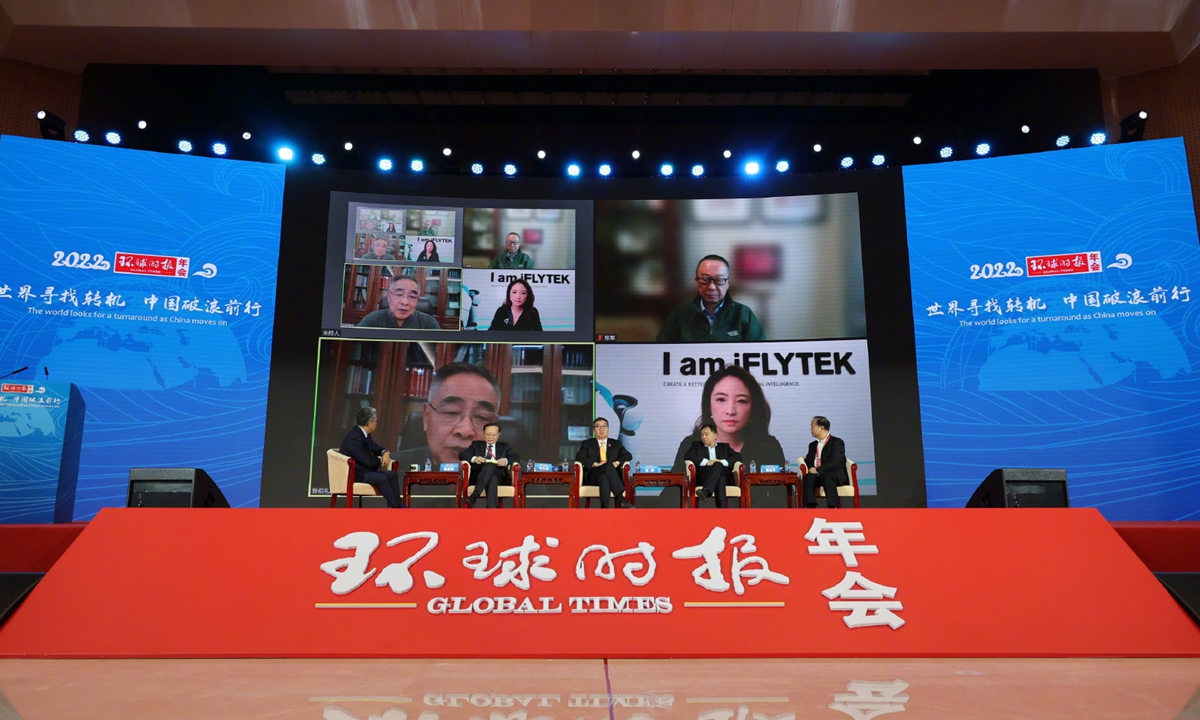
Experts and economists discuss China's 2022 economic outlook at the Global Times Annual Forum in Beijing on December 11, 2021. Photo: Li Hao/Global Times
China's economy could grow around 6 percent in 2022, a year in which the economic calendar is set to be punctuated by major events including the Beijing Winter Olympic Games and the 20th Communist Party of China (CPC) National Congress, former vice commerce minister Wei Jianguo said Saturday at the Global Times Annual Forum.
The resilience of the economy, underpinned by its success in containing the pandemic, and a pathway for China to unseat the US in economic terms at a quicker pace despite the shadow of US decoupling efforts, were some of the key takeaways from the forum.
The remarks were seen a shot in the arm for the economy, which according to the annual
Central Economic Work Conference concluded on Friday, is expected to face major challenges over the next twelve months-shrinking demand, supply crunch and downward pressure on economic prospects.
China's GDP growth could hit 9-9.5 percent this year before registering 6 percent in 2022, Wei Jianguo, vice chairman of the China Center for International Economic Exchange and former vice minister of the Ministry of Commerce, said during a panel discussion on the economy's outlook.
Wei cited the Winter Olympic Games and the 20th CPC National Congress as underpinning his optimism on the Chinese economy.
If China's GDP grows by 5 percent in the fourth quarter, annual growth will be around 8.5 percent, according to Cao Wenlian, the board chairman for the Moganshan Research Institute, at the forum.
Economic growth slowed to 4.9 percent in the third quarter, whereas the GDP growth reading for the first three quarters still held strong at 9.8 percent year-on-year, official data showed.
Although China's economy faces challenges next year, policy intensity will increase on 2021 levels, with some measures having already been rolled out in advance, Cao said during the same panel discussion.
"China's policy innovation is a very important driving force in view of its achievements in the past decades, especially when responding to changes across economic cycles," said Cao.
In a recent pro-growth move, the central bank on Monday announced a broad-based 0.5 percentage-point cut in the reserve requirement ratio for financial institutions, effective December 15.
"Next year, there will be more policies to support and protect market players, improve supply chains, and expand domestic demand," said Cao.
Additionally, macro-management policies will be gradually adjusted to pricing policies, as the market will start playing its role in allocation of commodity procurement, remarked Zhang Jun, dean of the School of Economics at Fudan University.
Other than policy innovation, observers urged efforts to foster the economy's technological development in the face of intermittent decoupling actions by the US.
"We should be vigilant against underlying tech becoming a bottleneck," said Du Lan, a senior vice president of Chinese AI giant iFlytek. More investment and attention should be given to underlying framework independence, she noted.
While views remain somewhat split over the future of China-US decoupling, experts are generally in favor of more domestically driven initiatives.
"Decoupling may be a trend that goes beyond the chip issue. China and the US, in my opinion, may become rule-makers for two different systems," Zhang stated.
China-US "decoupling" in investment and trade have proven to be impossible. As for microchips, it is actually a sector which did not "couple" in the first place, said Jia Kang, director of the China Academy of New Supply-side Economics.
It is certain that China and US peaceful competition can still be maintained, and the two can't realize completely decoupling, Jia said.

The Global Times Annual Forum, themed "The world looks for a turnaround as China moves on," is held on December 11, 2021 in Beijing. Photo: Lao Ma/Global Times
Virus efforts consolidating nation's leadThe nation's success in containing the virus and subsequent mutations has set the Chinese economy up for a stronger role globally, experts said at the panel, predicting China more rapidly displacing the US economically than previously thought.
China's targeted control and prevention against COVID-19 has been praised by many people around the world as a better model with less impact on the economy and society, according to Zhang Boli, a medical expert and academician with the Chinese Academy of Engineering.
There were voices criticizing China's model, but now they start to learn from China, he said.
It is believed that China will maintain a strict prevention approach before the Beijing Winter Olympic Games, the medical expert said.
After the Olympics and when the spring comes, China may adopt a more relaxed policy as the pandemic is expected to ease. It may become more convenient in terms of transportation and travel, but the restrictions won't be lifted completely in China, he continued.
China's economy will be similar to that of the US by 2025-27 if the two countries maintain the current growth rates. The COVID-19 pandemic brought forward the timetable for when China can surpass the US to become the largest economy, Cao Heping, a professor of economics at Peking University, said at the forum.
Assuming 5 percent growth in the fourth quarter, China's GDP growth in 2021 should be around 8.7 percent, while US' 2021 GDP growth is supposedly about 3 percent, if its fourth quarter economic growth could reach 6 percent, according to the professor.
The forecast suggests an even faster path for China to replace the US as the world's largest economy.
While earlier estimates contemplated that China's GDP may surpass that of the US in the early 2030s, a report released by the UK-based Center for Economics and Business Research in last December said that China's GDP is expected to overtake the US' to become the world's largest economy by 2028.
China's service sector now accounts for 54 percent of its national economy. Ten years ago, it was 44 percent, while the service sector in the US accounts for 82 percent of its economy and 92 percent in the UK, according to numbers shared by Cao Heping at the forum.
"The more the economy develops, the less labor is absorbed by traditional sectors and the lower the wages are. What are the results? The growth gap arises, and the gap between rich and poor becomes a more prominent issue than growth rate or other issues… Therefore new management modes are required," he said, noting that the explosive growth of big data, artificial intelligence and blockchain supported by digital technology is the highlight of China's overall economic growth.





